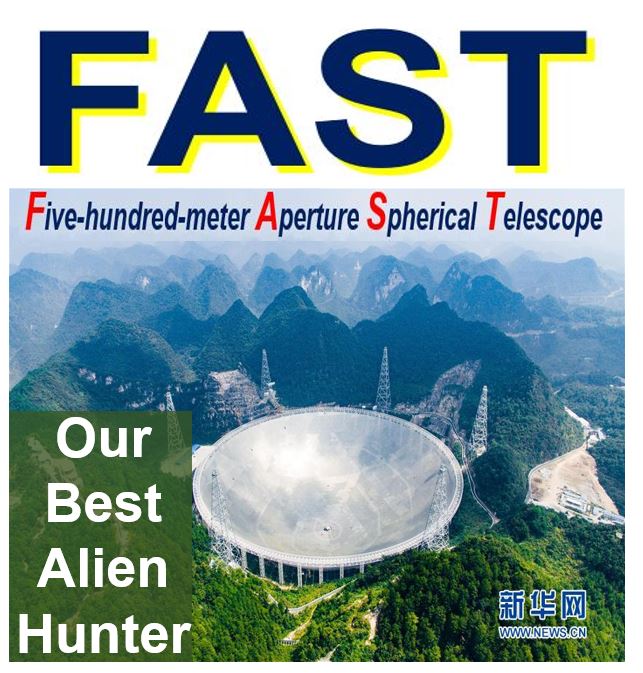The world’s largest radio telescope – FAST – which scientists say is now our best alien hunter, has been switched on, and adds to China’s ambitious portfolio of space and science projects. China today is definitely a world leader in space research and technology, as well as in several other sciences.
Chinese scientists have big hopes that their giant radio telescope – known as FAST (Five-hundred-meter Aperture Spherical Telescope 五百米口径球面射电望远镜) – will ‘hear’ messages from an alien civilization deep in space.
Nicknamed Tianyan (The Eye of Heaven), it is a radio telescope located in a natural basin in the Dawodang depression, in Pingtang County, Guizhou Province, in southwest China. It comprises a fixed 1,600 ft (500 metere) dish built in a natural depression in the landscape. It is the biggest filled aperture (single dish) radio telescope in the world.
 According to the FAST website: “FAST has three outstanding features: the unique karst depressions found in south Guizhou as the sites, the active main reflector of 500 m which directly corrects for spherical aberration, and the light-weight focus cabin driven by cables and a servomechanism plus a parallel robot as a secondary adjustable system to carry the most precise parts of the receivers.” (Image: adapted from fast.bao.ac.cn)
According to the FAST website: “FAST has three outstanding features: the unique karst depressions found in south Guizhou as the sites, the active main reflector of 500 m which directly corrects for spherical aberration, and the light-weight focus cabin driven by cables and a servomechanism plus a parallel robot as a secondary adjustable system to carry the most precise parts of the receivers.” (Image: adapted from fast.bao.ac.cn)
The installation of FAST’s main structure – a 4,450-panel reflector the size of 30 football pitches – was complete in early July.
FAST cost $180 million (CN¥1.2 billion) to build, which was considerably more than its original budget of CN¥700 million. The whole project took five years to complete.
8000 people made way for FAST
Over eight thousand people from eight villages had to be displaced to make way for the telescope, which needs a 3-mile radius of silence in order to work properly. The displaced villagers were given either new homes elsewhere or cash, according to local newspapers.
With a diameter of 500 metres, it is twice as sensitive and ten times as fast as any other radio telescope in the world. Scientists say it is so sensitive that it could capture the signal of a mobile phone being used on the Moon. It now pushes the 300-metre Arecibo Observatory in Puerto Rico into second place.
 Below the FAST reflective panels. (Image: fast.bao.ac.cn. Credit: Ou Dong and Qu She)
Below the FAST reflective panels. (Image: fast.bao.ac.cn. Credit: Ou Dong and Qu She)
The switching on of FAST was witnessed by hundreds of astronomers. Chinese President Xi Jinping sent a congratulatory letter to astronomers, engineers and builders on the launch of the radio telescope.
It will listen out for gravitational waves, radio emissions from distant galaxies and stars – as well as any signs of intelligent aliens. It is capable of picking up signals from several millions and even billions of light years away.
FAST – the ultimate alien hunter
Qian Lei, an associate researcher with the National Astronomical Observatories of the Chinese Academy of Sciences, said in an interview on CCTV:
“The ultimate goal of FAST is to discover the laws of the development of the universe. In theory, if there is civilization in outer space, the radio signal it sends will be similar to the signal we can receive when a pulsar (spinning neutron star) is approaching us.”
In an interview with Xinhua news agency, Nobel laureate Joseph Taylor, who works at Princeton University in the USA, said:
“[The telescope] will certainly generate enthusiasm, bring people into science, and make China important in the world of science.”
Prof @JohnsonFreese on #China‘s new #FAST #telescope: https://t.co/TuG01jvhBa @Telegraph #space
— Naval War College (@NavalWarCollege) September 26, 2016
FAST’s chief technologist, Wang Qiming, said the telescope will remain the global leader for the next decade or two.
Head of the NAO (National Astronomical Observatories), Yan Jun, said China is expected to roll out more state-of-the-art telescopes during the next five to ten years.
So far, it has heard a signal from a pulsar 1,351 light years away, according to local media reports. A pulsar is a type of neutron star, a dead relic of a massive star – it is highly magnetized and rotates at enormous speed. Its radio pulses, which are emitted at regular intervals, are picked up by our radio telescopes.
Video – FAST put into operation
This CCTV English video announces the switching on of the FAST telescope. It is our best hope in the hunt for alien life.
